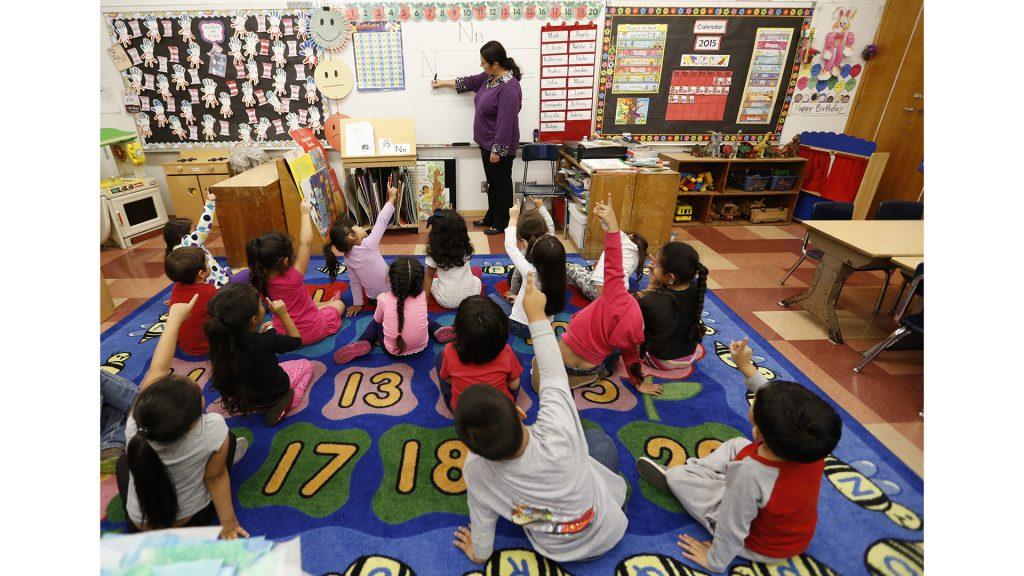Weigel: Student Teaching: All Work, No Pay
Should student teachers be paid or compensated? I tackle these questions and give some perspective from fellow students and the associate dean of the College of Ed.
National data show careful investments in high-quality preschools and small class size in elementary schools can pay off. Above, pre-K students at Dorris Place Elementary School in Los Angeles on May 12, 2015. (Al Seib/Los Angeles Times/TNS)
December 9, 2018
Many argue that college athletes — particularly football and basketball players — should be paid. Some argue that these athletes devote time to their sport and make tons of money for their universities. Therefore, they deserve a share of the massive pot of money that they help generate.
Meanwhile, although the argument for paying student teachers has been around for years, little attention has been given to the prospects of paying student teachers.
This coming semester I will be a student teacher and as such I will be tasked with refining all that I have learned in my education classes and teaching experiences by co-teaching with a veteran instructor. Hence, essentially this coming semester will serve as an internship or apprenticeship, where I will work with and learn from a full-time, experienced professional.
But, unlike many other students who partake in internships during college, my student teaching internship will be unpaid. In fact, I will have to pay full tuition and fees, in addition to other miscellaneous fees, for this on-the-job experience.
Ergo, my question is this: if people are up in arms about college athletes being exploited, shouldn’t we also be up in arms about student teachers being slighted?
Most college athletes get scholarships that cover their room and board even if they don’t get paid outright. These scholarships help defray the extravagant costs associated with attending college. Yet, in comparison, student teachers have to pay full price for their student teaching experience, with no supplemental monetary support in the form of a scholarship. Student teachers also don’t get their tuition waived like graduate teaching or research assistants.
On a certain level, I can understand why student teachers have to pay for their apprenticeship. Unlike student-athletes or graduate teaching/research assistants, student teachers don’t work directly for the university. They work in elementary, middle, or high schools — entities that are under the auspices of state and local government, not the university. So it makes sense that the university wouldn’t pay student teachers or waive their tuition because their service does not directly benefit the university.
While students in other majors have the option to partake in an internship, students looking to become teachers don’t have the option to forgo student teaching because it is required for nearly all teachers to get licensed. Only students who already have a bachelor’s and job experience in a secondary education content area have the option of bypassing the student teaching semester through an alternative pathway to teaching called RAPIL (Regents Alternative Pathway to Iowa Licensure) that allows professionals to take online teaching classes and intern at a school district.
To give a little more credence to my point about student teaching being an unpaid semester long apprenticeship, I asked some fellow students, faculty, and administrators to give their perspective on student teaching.
One student expressed concern about paying for tuition and the fees associated with student teaching.
“We have to pay tuition which is justified, but 15 semester hours is a large sum. Plus, there are additional fees of about $500 just for student teaching, $300 to take edTPA [Educational Teacher Performance Assessment — a required evaluation to be recommended for licensure], $150 to $200 to apply for licensure and get a background check, and provide our own transportation to where we teach,” the student said.
RELATED: Kumar: Budget cuts and broke college students
Moreover, this same student mentioned staff in the College of Education recommended that she quit her part-time job so that she could focus on student teaching.
Another student in the teacher education program suggested, “In terms of costs and savings, I don’t see why student teaching couldn’t be compensated by prorating tuition on the university’s end or providing a stipend on the district’s. I do think teachers are stuck in a weird gray area when we compare student teaching with internships and apprenticeships in other disciplines.”
Furthermore, this same student suggested that licensure may, in fact, be to blame for student-teachers’ precarious situation. “Fields which require licensure seem to require long stints of unpaid work to attain it. When licensure isn’t required, people seem to get paid. The problem is, teaching isn’t a licensure which gives you big returns on investment, and unskilled teaching isn’t as much of a liability to a school like unskilled dentistry would be to a practice.”
Dr. Nancy Langguth, Associate Dean of the College of Education, mentioned that the tuition student teachers pay goes in part toward coordinating the student teaching placements and assisting teacher candidates in their job search.
“Once we get money back from the university it helps fund things like mock interviews with area administrators, pay for the College of Ed’s job fair, refine students’ résumés, and network with school administrators. There’s also one staff member who is devoted to processing licensure paperwork and requirements.”
More to the point, a faculty member in the College of Education gave additional insight into where tuition money goes, saying that student teaching supervisors have to be paid. Plus, school districts get a stipend for allowing a student to student teach. Not to be remiss, special site placements in different states and countries have to be accommodated too.
Therefore, like paying college-athletes, it seems that the issue of paying student-teachers — or at least paring down the costs associated with student teaching — is quite a precarious situation with no cut-and-dried right or wrong answer.
Nonetheless, it’d sure be nice if all of us student teachers could get paid or not have to pay full tuition for our student teaching semester.




















